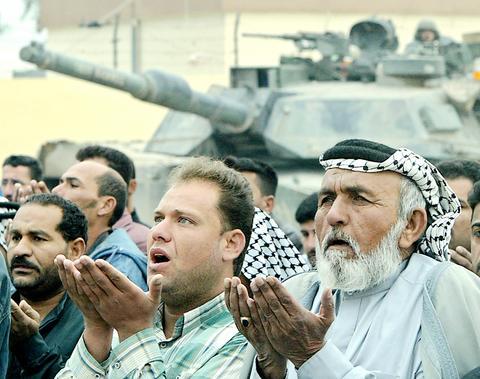Iraq's interim authority has submitted a timetable for self-rule and asked the UN Security Council for a new resolution that would end the US-led occupation in June.
Security on the ground in Iraq was intense as troops went on alert for attacks marking the end of the Muslim holy month of Ramadan after the grisly weekend killings of US soldiers.

PHOTO: REUTERS
In a letter to the Security Council on Monday, Jalal Talabani, president of the Iraqi Governing Council, promised to establish the "principle of civilian control over the Iraqi armed and security forces."
The US-appointed council said it would select a "provisional legislative body" no later than May 31 next year, which would elect a provisional government by the end of June.
Then "the Coalition Provisional Authority will be dissolved and the occupation ... will end," Talabani's letter said.
The future of their country was on the minds of Iraqis as thousands of Muslims gathered at Baghdad's Abu Hanifa mosque, one of Sunni Islam's holiest shrines, to pray and participate in the Eid al-Fitr, the celebration that marks the end of a month of dawn-to-dusk fasting.
"I don't think of this as Eid. If the Americans left and there was a new government, with law and order, then every day would be Eid," said Abdel Wadoud Doukhi as he left the mosque.
US military helicopters clattered low overhead, keeping watch following several small explosions earlier in the day and after three US soldiers were killed in two attacks on Sunday.
Since Washington declared major combat in Iraq over on May 1, 185 soldiers have died in action. Washington blames the attacks on insurgents loyal to toppled leader Saddam Hussein.
US President George W. Bush met families of some of the fallen soldiers during a visit to a Colorado army base and vowed to answer the attacks with more force.
"We're sending a clear message: Anyone who seeks to harm our soldiers can know that our great soldiers are hunting for them," Bush told troops and families at Fort Carson on Monday.
On Sunday, witnesses said two US soldiers were shot in the northern city of Mosul, before being dragged from their car in broad daylight and beaten and stabbed by an angry crowd.
Another soldier was killed on Sunday by a roadside bomb near the town of Baquba, 65km north of Baghdad.
The Governing Council's timetable, worked out with US and British officials, had been due on Dec. 15 but arrived three weeks early. It was requested in an October Security Council resolution, which created the multinational force in Iraq.
"... it has become appropriate for the Security Council to adopt a new resolution taking into consideration the new circumstances," Talabani wrote.
The US and Britain are considering a new resolution that would welcome or endorse the accelerated timetable, which Washington had opposed in October.
But faced with the mounting death toll, the Bush administration switched positions this month and decided to speed up a transfer of power.
Also See Story:
Security concern in Iraq shifting to local officials

SECURITY: As China is ‘reshaping’ Hong Kong’s population, Taiwan must raise the eligibility threshold for applications from Hong Kongers, Chiu Chui-cheng said When Hong Kong and Macau citizens apply for residency in Taiwan, it would be under a new category that includes a “national security observation period,” Mainland Affairs Council (MAC) Minister Chiu Chui-cheng (邱垂正) said yesterday. President William Lai (賴清德) on March 13 announced 17 strategies to counter China’s aggression toward Taiwan, including incorporating national security considerations into the review process for residency applications from Hong Kong and Macau citizens. The situation in Hong Kong is constantly changing, Chiu said to media yesterday on the sidelines of the Taipei Technology Run hosted by the Taipei Neihu Technology Park Development Association. With

CARROT AND STICK: While unrelenting in its military threats, China attracted nearly 40,000 Taiwanese to over 400 business events last year Nearly 40,000 Taiwanese last year joined industry events in China, such as conferences and trade fairs, supported by the Chinese government, a study showed yesterday, as Beijing ramps up a charm offensive toward Taipei alongside military pressure. China has long taken a carrot-and-stick approach to Taiwan, threatening it with the prospect of military action while reaching out to those it believes are amenable to Beijing’s point of view. Taiwanese security officials are wary of what they see as Beijing’s influence campaigns to sway public opinion after Taipei and Beijing gradually resumed travel links halted by the COVID-19 pandemic, but the scale of

A US Marine Corps regiment equipped with Naval Strike Missiles (NSM) is set to participate in the upcoming Balikatan 25 exercise in the Luzon Strait, marking the system’s first-ever deployment in the Philippines. US and Philippine officials have separately confirmed that the Navy Marine Expeditionary Ship Interdiction System (NMESIS) — the mobile launch platform for the Naval Strike Missile — would take part in the joint exercise. The missiles are being deployed to “a strategic first island chain chokepoint” in the waters between Taiwan proper and the Philippines, US-based Naval News reported. “The Luzon Strait and Bashi Channel represent a critical access

Pope Francis is be laid to rest on Saturday after lying in state for three days in St Peter’s Basilica, where the faithful are expected to flock to pay their respects to history’s first Latin American pontiff. The cardinals met yesterday in the Vatican’s synod hall to chart the next steps before a conclave begins to choose Francis’ successor, as condolences poured in from around the world. According to current norms, the conclave must begin between May 5 and 10. The cardinals set the funeral for Saturday at 10am in St Peter’s Square, to be celebrated by the dean of the College